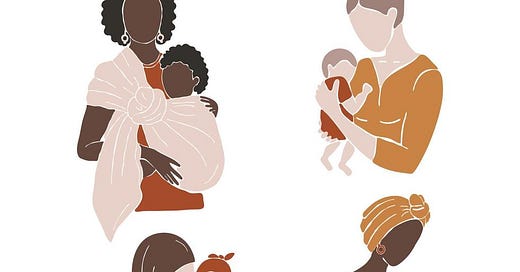Motherhood: The Original Blueprint for Democracy
What maternal care teaches us about empathy, survival, and the future of self-government
Before empathy was policy or philosophy, it was practice. A daily, ordinary, miraculous practice. It began, for most of us, in the arms of a mother.
This Mother’s Day, I’ve been thinking about what science and evolution already know: that motherhood is the original civic virtue. Long before governments rose or constitutions were written, before Thomas Paine declared that "the cause of America is in a great measure the cause of all mankind," mothers were showing us how to hold two truths at once—your need and mine, your pain and mine, your future and mine.
Empathy—the ability to feel with and for others—isn’t just a moral idea. It’s a biological inheritance. Studies show that motherhood literally rewires the brain, increasing sensitivity to the needs of others. Hormones like oxytocin surge. Neural pathways deepen. But the science only tells us what poets have known for centuries: that love, especially maternal love, teaches us how to belong to one another.
That’s not to romanticize motherhood. It’s to politicize it.
Because in a country that celebrates mothers with brunch and flowers but strips away childcare, maternal healthcare, and paid leave, our praise rings hollow. We should celebrate mothers not only for what they give—but for what their giving demands of the rest of us. That we build a society where care is not punishment. Where sacrifice isn’t gendered. Where empathy scales.
Thomas Paine argued that society is a blessing and government a necessary evil. But maybe he got it backwards. Maybe society, at its best, is the slow, uneven project of expanding what mothers already do. Making space for others. Caring across difference. Holding the future in trembling hands.
This is a post about Mother’s Day. But it’s also a post about democracy. Because if democracy is the idea that all people matter, and that we must learn to live as if that’s true—then mothers, in all their complexity, are its earliest architects.
Not just biological mothers, but chosen ones. Aunties, teachers, older sisters. The ones who mother without glory or pay. The ones who remind us: empathy isn’t weakness. It’s survival. It’s structure. It’s common sense.
To them, today and always: thank you.
(And, to close, an original poem for all the supermoms.)






Beautiful mothers full of love and grace. Blessings.
Mrs. Gloria Bailey, Independent Artist Scholar. Dr. B and Mrs. B Empty Nesters Lifestyle. North Carolina.